 Libri di Zygmunt Bauman su Unilibro.it
)
Libri di Zygmunt Bauman su Unilibro.it
)
|
|
2014 |
 Title :
Visti di uscita e biglietti di entrata. paradossi dell'assimilazione ebraica
Title :
Visti di uscita e biglietti di entrata. paradossi dell'assimilazione ebraicaAuthor: Bauman Zygmunt Publisher: Giuntina Dal Settecento, in Europa, agli ebrei si chiede di assimilarsi. In cambio si promette loro l'eguaglianza. Due secoli dopo quella parabola finirà con milioni di morti. In mezzo, come racconta Bauman, il percorso è stato accidentato: quanto più gli ebrei vanno in cerca dell'assimilazione, tanto più la diffidenza nei loro confronti cresce. Zygmunt Bauman, in questo suo testo del 1988, analizza i meccanismi culturali che stanno dietro alle richieste che le società nazionali europee, soprattutto quella tedesca, hanno rivolto agli ebrei tra Ottocento e Novecento per accoglierli, ma senza mai rimuovere le proprie diffidenze. La conseguenza fu che ancora prima dello sterminio anche i volenterosi che aspiravano all'assimilazione si trovarono in una 'terra di nessuno', sospesi nel niente. Spesso furono i primi a cadere. € 10,00
Scontato: € 9,50
|
|
|
1913 |
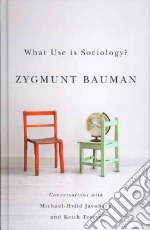 Title :
What Use Is Sociology?
Title :
What Use Is Sociology?Author: Bauman Zygmunt, Jacobsen Michael Hviid (CON), Tester Keith (CON) Publisher: John Wiley & Sons Inc What's the use of sociology? The question has been asked often enough and it leaves a lingering doubt in the minds of many. At a time when there is widespread scepticism about the value of sociology and of the social sciences generally, this short book by one of the world's leading thinkers offers a passionate, engaging and important statement of the need for sociology. In a series of conversations with Michael Hviid Jacobsen and Keith Tester, Zygmunt Bauman explains why sociology is necessary if we hope to live fully human lives. But the kind of sociology he advocates is one which sees 'use' as more than economic success and knowledge as more than the generation of facts. Bauman makes a powerful case for the practice of sociology as an ongoing dialogue with human experience, and in so doing he issues a call for us all to start questioning the common sense of our everyday lives. He also offers the clearest statement yet of the principles which inform his own work, reflecting on his life and career and on the role of sociology in our contemporary liquid-modern world. This book stands as a testimony to Bauman's belief in the enduring relevance of sociology. But it is also a call to us all to start questioning the world in which we live and to transform ourselves from being the victims of circumstance into the makers of our own history. For that, at the end of the day, is the use of sociology. € 52,90
|
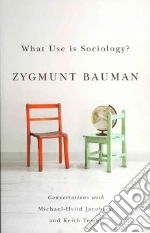 Title :
What Use Is Sociology?
Title :
What Use Is Sociology?Author: Bauman Zygmunt, Jacobsen Michael Hviid (CON), Tester Keith (CON) Publisher: Polity Pr What's the use of sociology? The question has been asked often enough and it leaves a lingering doubt in the minds of many. At a time when there is widespread scepticism about the value of sociology and of the social sciences generally, this short book by one of the world's leading thinkers offers a passionate, engaging and important statement of the need for sociology. In a series of conversations with Michael Hviid Jacobsen and Keith Tester, Zygmunt Bauman explains why sociology is necessary if we hope to live fully human lives. But the kind of sociology he advocates is one which sees 'use' as more than economic success and knowledge as more than the generation of facts. Bauman makes a powerful case for the practice of sociology as an ongoing dialogue with human experience, and in so doing he issues a call for us all to start questioning the common sense of our everyday lives. He also offers the clearest statement yet of the principles which inform his own work, reflecting on his life and career and on the role of sociology in our contemporary liquid-modern world. This book stands as a testimony to Bauman's belief in the enduring relevance of sociology. But it is also a call to us all to start questioning the world in which we live and to transform ourselves from being the victims of circumstance into the makers of our own history. For that, at the end of the day, is the use of sociology. € 17,60
|
 Title :
Does the Richness of the Few Benefit Us All?
Title :
Does the Richness of the Few Benefit Us All?Author: Bauman Zygmunt Publisher: John Wiley & Sons Inc It is commonly assumed that the best way to help the poor out of their misery is to allow the rich to get richer, that if the rich pay less taxes then all the rest of us will be better off, and that in the final analysis the richness of the few benefits us all. And yet these commonly held beliefs are flatly contradicted by our daily experience, an abundance of research findings and, indeed, logic. Such bizarre discrepancy between hard facts and popular opinions makes one pause and ask: why are these opinions so widespread and resistant to accumulated and fast-growing evidence to the contrary? This short book is by one of the world’s leading social thinkers is an attempt to answer this question. Bauman lists and scrutinizes the tacit assumptions and unreflected-upon convictions upon which such opinions are grounded, finding them one by one to be false, deceitful and misleading. Their persistence could be hardly sustainable were it not for the role they play in defending - indeed, promoting and reinforcing - the current, unprecedented, indefensible and still accelerating growth in social inequality and the rapidly widening gap between the elite of the rich and the rest of society. € 47,00
|
 Title :
Does the Richness of the Few Benefit Us All?
Title :
Does the Richness of the Few Benefit Us All?Author: Bauman Zygmunt Publisher: Polity Pr It is commonly assumed that the best way to help the poor out of their misery is to allow the rich to get richer, that if the rich pay less taxes then all the rest of us will be better off, and that in the final analysis the richness of the few benefits us all. € 17,90
|
 Title :
Moral Blindness
Title :
Moral BlindnessAuthor: Bauman Zygmunt, Donskis Leonidas Publisher: Polity Pr Evil is not confined to war or to circumstances in which people are acting under extreme duress. Today it more frequently reveals itself in the everyday insensitivity to the suffering of others, in the inability or refusal to understand them and in the casual turning away of one’s ethical gaze. Evil and moral blindness lurk in what we take as normality and in the triviality and banality of everyday life, and not just in the abnormal and exceptional cases. The distinctive kind of moral blindness that characterizes our societies is brilliantly analysed by Zygmunt Bauman and Leonidas Donskis through the concept of adiaphora: the placing of certain acts or categories of human beings outside of the universe of moral obligations and evaluations. Adiaphora implies an attitude of indifference to what is happening in the world – a moral numbness. In a life where rhythms are dictated by ratings wars and box-office returns, where people are preoccupied with the latest gadgets and forms of gossip, in our ‘hurried life’ where attention rarely has time to settle on any issue of importance, we are at serious risk of losing our sensitivity to the plight of the other. Only celebrities or media stars can expect to be noticed in a society stuffed with sensational, valueless information. This probing inquiry into the fate of our moral sensibilities will be of great interest to anyone concerned with the most profound changes that are silently shaping the lives of everyone in our contemporary liquid-modern world. € 68,30
|
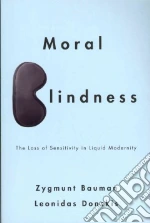 Title :
Moral Blindness
Title :
Moral BlindnessAuthor: Bauman Zygmunt, Donskis Leonidas Publisher: Polity Pr Evil is not confined to war or to circumstances in which people are acting under extreme duress. Today it more frequently reveals itself in the everyday insensitivity to the suffering of others, in the inability or refusal to understand them and in the casual turning away of one’s ethical gaze. Evil and moral blindness lurk in what we take as normality and in the triviality and banality of everyday life, and not just in the abnormal and exceptional cases. The distinctive kind of moral blindness that characterizes our societies is brilliantly analysed by Zygmunt Bauman and Leonidas Donskis through the concept of adiaphora: the placing of certain acts or categories of human beings outside of the universe of moral obligations and evaluations. Adiaphora implies an attitude of indifference to what is happening in the world – a moral numbness. In a life where rhythms are dictated by ratings wars and box-office returns, where people are preoccupied with the latest gadgets and forms of gossip, in our ‘hurried life’ where attention rarely has time to settle on any issue of importance, we are at serious risk of losing our sensitivity to the plight of the other. Only celebrities or media stars can expect to be noticed in a society stuffed with sensational, valueless information. This probing inquiry into the fate of our moral sensibilities will be of great interest to anyone concerned with the most profound changes that are silently shaping the lives of everyone in our contemporary liquid-modern world. € 20,50
|
|
2013 |
 Title :
Le sorgenti del male
Title :
Le sorgenti del maleAuthor: Bauman Zygmunt; Park Y. (cur.); Mazzeo R. (cur.) Publisher: Erickson Che cos'è il male oggi? In che modo si può dire che le sue manifestazioni, le sue spinte, le sue modalità di aggredire il tessuto del mondo e delle persone che lo abitano si siano modificate? Zygmunt Bauman, uno dei più grandi pensatori viventi, già nel 1989, con 'Modernità e olocausto', aveva riletto le atrocità del Terzo Reich sovvertendo l'opinione comune che si fosse trattato di un 'incidente' della Storia e dimostrando che invece la 'società dei giardinieri' illuministi (bene attenti a estirpare le 'erbacce') aveva raggiunto con l'olocausto il suo risultato più esemplare. In questo libro Bauman compie un ulteriore decisivo passo avanti nell'identificazione del 'male' ai giorni nostri. E lo fa con una ricognizione delle tesi fallaci che si erano affermate nel Novecento (dalla 'personalità autoritaria' di Adorno alla 'banalità del male' di Hannah Arendt) per mostrare poi, in un corpo a corpo con le opere di Jonathan Littell e di Günther Anders, che la presa di distanza dagli esiti dei nostri atti distruttivi (resa non solo possibile, ma obbligata, dalle mirabilia tecnologiche e dalla costrizione 'diversamente morale' a non sprecare armi la cui produzione ha richiesto quantità esorbitanti di denaro) contribuisce a erodere la nostra sensibilità già gravemente indebolita, malcerta, afona. € 10,00
|
 Title :
Lo spirito e il clic. La società contemporanea tra frenesia e bisogno di speranza
Title :
Lo spirito e il clic. La società contemporanea tra frenesia e bisogno di speranzaAuthor: Bauman Zygmunt Publisher: San Paolo Edizioni Zygmunt Bauman, il sociologo polacco famoso in tutto il mondo per il concetto di modernità liquida, affronta in questo testo agile ed estremamente attuale il tema della religione e della fede. Oggi nella tremenda crisi di valori che stiamo vivendo, anche la religione, in qualche misura, sta subendo lo stesso destino della società liquida. Assistiamo a una sorta di evaporazione della spiritualità. Il rischio, al di là dell'osservanza da parte dei cattolici degli appuntamenti liturgici, è che queste manifestazioni di adesione e di partecipazione rimangano in superficie, senza entrare davvero nel cuore delle persone. Ma il bisogno di speranza non può essere cancellato dal cuore dell'uomo, e questo apre nuove porte alla fede. € 6,90
|
 Title :
Danni collaterali. Diseguaglianze sociali nell'età globale
Title :
Danni collaterali. Diseguaglianze sociali nell'età globaleAuthor: Bauman Zygmunt Publisher: Laterza Il termine 'danni collaterali' appartiene al linguaggio militare per indicare le conseguenze indesiderate delle operazioni belliche che comportano costi altissimi in termini umani. Non sono però prerogativa esclusiva della guerra: i danni collaterali rappresentano uno degli aspetti più diretti e sconcertanti dell'ineguaglianza sociale che caratterizza la nostra epoca. Perché ad essere intrinsecamente votati ai danni collaterali sono i poveri, per sempre segnati dal duplice marchio dell'irrilevanza e dell'indegnità. Causare danni collaterali è più facile nei quartieri loschi e tra le strade più malfamate delle città che nelle tranquille zone residenziali abitate da uomini potenti e altolocati. Tra l'occupare il gradino più basso della scala della disuguaglianza e il ritrovarsi 'vittima collaterale' di un'azione umana o di un disastro naturale esiste lo stesso rapporto che intercorre tra i poli opposti delle calamite, che tendono a gravitare l'uno verso l'altro. € 16,00
|
 Title :
«La ricchezza di pochi avvantaggia tutti». Falso!
Title :
«La ricchezza di pochi avvantaggia tutti». Falso!Author: Bauman Zygmunt Publisher: Laterza In quasi tutto il mondo la disuguaglianza sta aumentando, e ciò significa che i ricchi, e soprattutto i molto ricchi, diventano più ricchi, mentre i poveri, e soprattutto i molto poveri, diventano più poveri. Questa è la conseguenza ultima dell'aver sostituito la competizione e la rivalità alla cooperazione amichevole, alla condivisione, alla fiducia, al rispetto. Ma non c'è vantaggio nell'avidità. Nessun vantaggio per nessuno. Eppure abbiamo creduto che l'arricchimento di pochi fosse la via maestra per il benessere di tutti. € 9,00
Scontato: € 8,55
|
 Title :
Gli usi postmoderni del sesso
Title :
Gli usi postmoderni del sessoAuthor: Bauman Zygmunt Publisher: Il Mulino Cosa ne è dell'amore quando l'erotismo impera? Sesso, erotismo e amore: mondi collegati e tuttavia separati. È difficile che possano darsi l'uno senza gli altri, eppure si consumano in una guerra perenne per l'indipendenza. Come in tutte le guerre, nel tempo mutano le strategie e i rapporti di forza. Nella società postmoderna è l'erotismo ad aver assunto un ruolo senza precedenti: non più alleato con la riproduzione sessuale né con l'amore, esso reclama la propria indipendenza da entrambi, e mette prepotentemente in primo piano il piacere e l'esperienza vissuta. Il prezzo da pagare, segnala Bauman, è un rapido indebolimento dei rapporti umani, che si spogliano via via di intimità ed emotività. € 10,00
Scontato: € 9,50
|
 Title :
Cose che abbiamo in comune. 44 lettere dal mondo liquido
Title :
Cose che abbiamo in comune. 44 lettere dal mondo liquidoAuthor: Bauman Zygmunt Publisher: Laterza 'Queste sono storie ispirate a delle esistenze comuni, da cui trarre spunti per rivelare ed esporre una straordinarietà altrimenti difficile da cogliere. Se vogliamo che ciò che all'apparenza ci è familiare lo diventi davvero, dobbiamo per prima cosa rendercelo estraneo. Si tratta di un compito difficile e la piena riuscita è quanto meno incerta. Tuttavia è questo l'obiettivo che noi, lo scrittore di queste quarantaquattro lettere e i suoi lettori, ci prefiggiamo per la nostra avventura. Ma perché proprio quarantaquattro? Sospetto che la maggior parte dei lettori si porrà questa domanda. Sento di dover loro una spiegazione. Adam Mickiewicz, il più grande poeta romantico polacco, inventò un personaggio misterioso, un portavoce della Libertà e suo rappresentante, o vicereggente sulla Terra, il cui nome è Quarantaquattro. Grazie ad Adam Mickiewicz il numero quarantaquattro simboleggia lo stupore e la speranza che accompagnano l'arrivo della Libertà. È un numero che annuncia, in modo indiretto e solo agli iniziati, il tema conduttore di queste missive. Lo spettro della libertà aleggia in ciascuna di loro. Anche quando si trattano temi del tutto diversi. Anche quando la sua presenza, come per ogni spettro degno di questo nome, appare invisibile.' (Zygmunt Bauman) € 12,00
Scontato: € 11,40
|
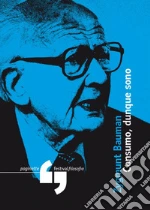 Title :
Consumo, dunque sono
Title :
Consumo, dunque sonoAuthor: Bauman Zygmunt Publisher: Consorzio Festivalfilosofia Un'analisi della mercificazione dei rapporti sociali e sentimentali, nei quali anche le persone sono trasformate in cose. € 3,50
|
||
|
1913 |
 Title :
Vida Liquida
Title :
Vida LiquidaAuthor: BAUMAN ZYGMUNT Publisher: Planeta VIDA LIQUIDA - BAUMAN ZYGMUNT - Planeta € 8,50
|
|
|
1912 |
 Title :
Liquid Surveillance
Title :
Liquid SurveillanceAuthor: Bauman Zygmunt, Lyon David Publisher: Polity Pr ‘Today the smallest details of our daily lives are tracked and traced more closely than ever before, and those who are monitored often cooperate willingly with the monitors. From London and New York to New Delhi, Shanghai and Rio de Janeiro, video cameras are a familiar and accepted sight in public places. Air travel now commonly involves devices such as body-scanners and biometric checks that have proliferated in the wake of 9/11. And every day Google and credit-card issuers note the details of our habits, concerns and preferences, quietly prompting customized marketing strategies with our active, all too often zealous cooperation. In today’s liquid modern world, the paths of daily life are mobile and flexible. Crossing national borders is a commonplace activity and immersion in social media increasingly ubiquitous. Today’s citizens, workers, consumers and travellers are always on the move but often lacking certainty and lasting bonds. But in this world where spaces may not be fixed and time is boundless, our perpetual motion does not go unnoticed. Surveillance spreads in hitherto unimaginable ways, responding to and reproducing the slippery nature of modern life, seeping into areas where it once had only marginal sway. In this book the surveillance analysis of David Lyon meets the liquid modern world so insightfully dissected by Zygmunt Bauman. Is a dismal future of moment-by-moment monitoring closing in, or are there still spaces of freedom and hope? How do we realize our responsibility for the human beings before us, often lost in discussions of data and categorization? Dealing with questions of power, technology and morality, this book is a brilliant analysis of what it means to be watched – and watching – today. € 11,70
|
 Title :
On Education
Title :
On EducationAuthor: Bauman Zygmunt, Mazzeo Riccardo Publisher: Polity Pr What is the role of education in a world where we no longer have a clear vision of the future and where the idea of a single, universal model of humanity seems like the residue of a bygone age? What role should educators play in a world where young people find themselves faced with deep uncertainty about their future, where the prospects of securing a stable, long-term career seem increasingly remote and where intensified population movements have created more diverse communities in which different cultures find themselves living side by side, no longer bound together by the belief that the other would eventually be assimilated into 'our' culture? Faced with the bewildering features of our liquid modern world, many young people are inclined to withdraw - in some cases into the online world of games and virtual relationships, in other cases into anorexia, depression, alcohol or even drug abuse, hoping to find shelter from a world perceived as more and more dangerous. Others launch into more violent forms of behaviour, like street gangs and the looting carried out by young people who have been excluded from the temples of consumption but are eager to participate in the ceremony. And all this happens while our politicians look on, uncomprehending and indifferent. In this short book Zygmunt Bauman - the leading social theorist of our liquid modern world, here in conversation with Riccardo Mazzeo - reflects on the predicament of young people today and on the role of education and the educator in a world where the certainties of our predecessors can no longer be taken for granted. € 17,60
|
|
2012 |
 Title :
Cos'è accaduto alla natura?
Title :
Cos'è accaduto alla natura?Author: Bauman Zygmunt Publisher: Consorzio Festivalfilosofia L'autore discute le moderne teorie sul dominio della natura fino alla situazione attuale, nella quale l'incidenza dei fattori umani sulle trasformazioni naturali rischia di condurre a esiti catastrofici. € 3,50
|
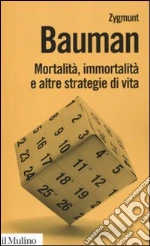 Title :
Mortalità, immortalità e altre strategie di vita
Title :
Mortalità, immortalità e altre strategie di vitaAuthor: Bauman Zygmunt Publisher: Il Mulino Bauman esplora in questo saggio come la cultura contemporanea si atteggi davanti al tabù della morte, come la consapevolezza del morire porti a elaborare determinate strategie di vita. Una prima strategia individuata dall'autore consiste nella 'decostruzione della morte', ossia nello spostare l'attenzione dalla morte alle sue cause (malattie, incidenti), che sono sempre contingenti, evitabili, razionalmente aggredibili. In un certo senso, nella società contemporanea non si muore, si è uccisi da qualcosa. Una seconda strategia consiste viceversa nella 'decostruzione dell'immortalità', ossia nell'annullamento dell'idea di eternità in un presente fatto di momenti, dove transitorio e duraturo si confondono, dove prima e dopo, storia ed eterno non contano più. € 14,00
Scontato: € 13,30
|
 Title :
Vite che non possiamo permetterci. Conversazioni con Citlali Rovirosa-Madrazo
Title :
Vite che non possiamo permetterci. Conversazioni con Citlali Rovirosa-MadrazoAuthor: Bauman Zygmunt Publisher: Laterza A partire dall'attuale crisi finanziaria, e sollecitato dalle domande di Citlali Rovirosa-Madrazo, Zygmunt Bauman esamina alcuni dei temi morali e politici più urgenti del nostro tempo: dal terrorismo internazionale e dal fondamentalismo religioso al declino dello Stato-nazione, alle minacce del riscaldamento globale, a cosa accade delle nostre vite. 'Se si potessero paragonare le teorie sociali o i teorici della sociologia alle attrezzature di cucina, Zygmunt Bauman sarebbe sicuramente uno dei coltelli più taglienti. Tuttavia la sua lama, come la maggior parte delle lame, è a doppio taglio. Se si cerca di imparare a utilizzarlo senza farsi male si finirà puntualmente per affettarsi un dito e inondare di sangue le cipolle senza riuscire ad arrivare al cuore di esse per la semplice ragione che non esiste. Bauman riesce a far apparire simili a cipolle i tanti e complessi strati della storia e la saga della filosofia occidentale. Mentre sfida il capitalismo, Bauman sfida anche il comunismo: e questa è forse un'altra buona ragione per leggere la sua opera in tempi di recessione. Bauman insorge contro la Chiesa e contro lo Stato che ama definire 'inseparabili fratelli siamesi' - senza mostrare alcun segno di nostalgia né dell'una né dell'altro. E come se non bastasse, sembra sfidare la scienza o, più precisamente, conserva verso di essa fiducia e rispetto, ma sospetta del suo flirt con il mercato'. € 9,50
Scontato: € 9,03
|
 Title :
L'Europa è un'avventura
Title :
L'Europa è un'avventuraAuthor: Bauman Zygmunt Publisher: Laterza Secondo Bauman, a differenza del passato illustre del continente, oggi l'Europa sembra aver perso la sicurezza in se stessa e il gusto dell'avventura. Presa nelle spire di un mondo che si trasforma, comincia a guardare agli altri con diffidenza e paura, si chiude agli immigrati, affoga nella povertà della sua fantasia, nella limitatezza delle sue risorse e non ha più volontà sufficiente per seguire le sue inclinazioni. Eppure mai prima d'ora questo pianeta ha avuto bisogno di un'Europa disposta a guardare oltre le proprie frontiere. Di un'Europa che può giocare un ruolo vitale a patto di ritrovare la sua identità e condividere quell'esperienza di libertà, democrazia e giustizia che ha appreso duramente lungo il suo percorso tortuoso. € 8,50
Scontato: € 8,08
|
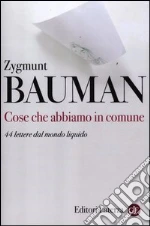 Title :
Cose che abbiamo in comune. 44 lettere dal mondo liquido
Title :
Cose che abbiamo in comune. 44 lettere dal mondo liquidoAuthor: Bauman Zygmunt Publisher: Laterza 'Queste sono storie ispirate a delle esistenze comuni, da cui trarre spunti per rivelare ed esporre una straordinarietà altrimenti difficile da cogliere. Se vogliamo che ciò che all'apparenza ci è familiare lo diventi davvero, dobbiamo per prima cosa rendercelo estraneo. Si tratta di un compito difficile e la piena riuscita è quanto meno incerta. Tuttavia è questo l'obiettivo che noi, lo scrittore di queste quarantaquattro lettere e i suoi lettori, ci prefiggiamo per la nostra avventura. Ma perché proprio quarantaquattro? Sospetto che la maggior parte dei lettori si porrà questa domanda. Sento di dover loro una spiegazione. Adam Mickiewicz, il più grande poeta romantico polacco, inventò un personaggio misterioso, un portavoce della Libertà e suo rappresentante, o vicereggente sulla Terra, il cui nome è Quarantaquattro. Grazie ad Adam Mickiewicz il numero quarantaquattro simboleggia lo stupore e la speranza che accompagnano l'arrivo della Libertà. È un numero che annuncia, in modo indiretto e solo agli iniziati, il tema conduttore di queste missive. Lo spettro della libertà aleggia in ciascuna di loro. Anche quando si trattano temi del tutto diversi. Anche quando la sua presenza, come per ogni spettro degno di questo nome, appare invisibile.' (Zygmunt Bauman) € 15,00
|
|
|
1911 |
 Title :
Culture in a Liquid Modern World
Title :
Culture in a Liquid Modern WorldAuthor: Bauman Zygmunt, Bauman Lydia (TRN) Publisher: Polity Pr In its original formulation, 'culture' was intended to be an agent for change, a mission undertaken with the aim of educating 'the people' by bringing the best of human thought and creativity to them. But in our contemporary liquid-modern world, culture has lost its missionary role and has become a means of seduction: it seeks no longer to enlighten the people but to seduce them. The function of culture today is not to satisfy existing needs but to create new ones, while simultaneously ensuring that existing needs remain permanently unfulfilled. Culture today likens itself to a giant department store where the shelves are overflowing with desirable goods that are changed on a daily basis - just long enough to stimulate desires whose gratification is perpetually postponed. In this new book Zygmunt Bauman - one of the most brilliant and influential social thinkers of our time - retraces the peregrinations of the concept of culture and examines its fate in a world marked by the powerful new forces of globalization, migration and the intermingling of populations. He argues that Europe has a particularly important role to play in revitalizing our understanding of culture precisely because Europe, with its great diversity of peoples, languages and histories, is the space where the Other is always one's neighbour and where each is constantly called upon to learn from everyone else. € 17,90
|
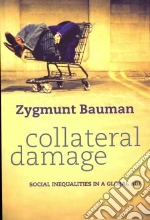 Title :
Collateral Damage
Title :
Collateral DamageAuthor: Bauman Zygmunt Publisher: Polity Pr The term 'collateral damage' has recently been added to the vocabulary of military forces to refer to the unintended consequences of armed interventions, consequences that are unplanned but nevertheless damaging and often very costly in human and personal terms. But collateral damage is not unique to the world of armed intervention - it is also one of the most salient and striking dimensions of contemporary social inequality. The inflammable mixture of growing social inequality and the rising volume of human suffering marginalized as 'collateral' is becoming one of the most cataclysmic problems of our time. For the political class, poverty is commonly seen as a problem of law and order - a matter of how to deal with individuals, such as unemployed youths, who fall foul of the law. But treating poverty as a criminal problem obscures the social roots of inequality, which lie in the combination of a consumerist life philosophy propagated and instilled by a consumer-oriented economy, on the one hand, and the rapid shrinking of life chances available to the poor, on the other. In our contemporary, liquid-modern world, the poor are the collateral damage of a profit-driven, consumer-oriented society - 'aliens inside' who are deprived of the rights enjoyed by other members of the social order. In this new book Zygmunt Bauman - one of the most original and influential social thinkers of our time - examines the selective affinity between the growth of social inequality and the rise in the volume of 'collateral damage' and considers its implications and its costs. € 17,90
|
|
2011 |
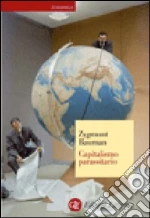 Title :
Capitalismo parassitario
Title :
Capitalismo parassitarioAuthor: Bauman Zygmunt Publisher: Laterza 'Nella modernità liquida raramente una cosa mantiene la sua forma abbastanza a lungo da ispirare fiducia e da solidificarsi in affidabilità. Camminare è meglio che rimanere seduti, correre è meglio di camminare e fare surf è ancor meglio di correre'. La tempesta perfetta provocata dall'attuale tsunami finanziario si è abbattuta sulla società liquida di consumatori che aspettava soltanto una nuova onda su cui 'surfare'. Ad andare in pezzi è l'utopia dominante di questi anni, quella che vedeva il dominio di un mercato capace di autoregolarsi, in cui esisteva soltanto un contatto armonioso tra chi vende merci e chi le acquista. Una fede che assegnava al credito al consumo un ruolo 'magico', finanziando tutti senza alcuna precauzione, declassando lo Stato semplicemente a garante della fluidità di questo scambio. Lo stesso è avvenuto per la cultura il cui slogan è diventato 'massimo impatto e obsolescenza immediata': le idee si sono trasformate in merci da accatastare sugli scaffali di un supermercato globale dove devono attrarre l'attenzione dei consumatori immediatamente ed essere sostituite in pochissimo tempo. Nella fase 'solida' della modernità un sistema culturale doveva offrire norme rigide e narrazioni coerenti alle quali conformarsi, nei nostri tempi liquidi, all'opposto, suggestioni ed emozioni che seducono e non implicano obblighi e responsabilità. € 7,50
|
 Title :
Conversazioni sull'educazione
Title :
Conversazioni sull'educazioneAuthor: Bauman Zygmunt; Mazzeo Riccardo Publisher: Erickson Qual è il ruolo dell'educazione in un tempo che ha smarrito una chiara visione del futuro e in cui l'idea di un modello unico e condiviso di umanità sembra essere il residuo di un'era ormai conclusa? Quale ruolo dovrebbero rivestire gli educatori ora che i giovani vivono una profonda incertezza rispetto al loro futuro, i progetti sono diventati più difficili, le norme tradizionali sono meno autorevoli e flussi sempre più cospicui di persone hanno creato comunità variegate in cui diverse culture si ritrovano a vivere vicine senza più essere unite dalla convinzione che l'altro verrà prima o poi assimilato alla 'nostra' cultura? Posti di fronte alle sconcertanti caratteristiche del nostro mondo liquido moderno, molti giovani tendono a ritirarsi - in alcuni casi nella rete, in giochi e relazioni virtuali, in altri casi nell'anoressia, nella depressione, nell'abuso di alcol o droghe - nella speranza di proteggersi così da un universo oscuro e vorticoso, altri si lanciano in forme di comportamento più violento. In questo breve libro Zygmunt Bauman, qui in conversazione con Riccardo Mazzeo, riflette sulla situazione dei giovani d'oggi e sul ruolo dell'educazione e degli educatori. € 13,00
|
 Title :
L'etica in un mondo di consumatori
Title :
L'etica in un mondo di consumatoriAuthor: Bauman Zygmunt Publisher: Laterza Smantellata gran parte dei limiti spazio-temporali che delimitavano le potenzialità delle nostre azioni, non possiamo più ripararci dalla ragnatela della dipendenza globale. È questa la situazione in cui, volenti o nolenti, portiamo avanti oggigiorno la nostra storia comune. Anche se molto - forse tutto o quasi tutto - in questa storia in divenire dipende dalle scelte umane, le condizioni in cui tali scelte vengono fatte non sono a loro volta soggette a scelta. Si può essere 'favorevoli' o 'contrari' rispetto alla nostra interdipendenza planetaria, ma sarebbe come dire di essere a favore o a sfavore della prossima eclissi solare o lunare. Acconsentire od opporsi, però, alla forma squilibrata che la globalizzazione della condizione umana ha assunto fino a questo momento, questo sì che può fare una grande differenza. € 12,00
Scontato: € 11,40
|
 Title :
Modernità liquida
Title :
Modernità liquidaAuthor: Bauman Zygmunt Publisher: Laterza La metafora della liquidità, da quando Bauman l'ha coniata, ha marcato i nostri anni ed è entrata nel linguaggio comune per descrivere la modernità nella quale viviamo. Individualizzata, privatizzata, incerta, flessibile, vulnerabile, nella quale a una libertà senza precedenti fanno da contraltare una gioia ambigua e un desiderio impossibile da saziare. € 18,00
Scontato: € 17,10
|
 Title :
Vite che non possiamo permetterci. Conversazioni con Citlali Rovirosa-Madrazo
Title :
Vite che non possiamo permetterci. Conversazioni con Citlali Rovirosa-MadrazoAuthor: Bauman Zygmunt Publisher: Laterza A partire dall'attuale crisi finanziaria, e sollecitato dalle domande di Citlali Rovirosa-Madrazo, Zygmunt Bauman esamina alcuni dei temi morali e politici più urgenti del nostro tempo: dal terrorismo internazionale e dal fondamentalismo religioso al declino dello Stato-nazione, alle minacce del riscaldamento globale, a cosa accade delle nostre vite. 'Se si potessero paragonare le teorie sociali o i teorici della sociologia alle attrezzature di cucina, Zygmunt Bauman sarebbe sicuramente uno dei coltelli più taglienti. Tuttavia la sua lama, come la maggior parte delle lame, è a doppio taglio. Se si cerca di imparare a utilizzarlo senza farsi male si finirà puntualmente per affettarsi un dito e inondare di sangue le cipolle senza riuscire ad arrivare al cuore di esse per la semplice ragione che non esiste. Bauman riesce a far apparire simili a cipolle i tanti e complessi strati della storia e la saga della filosofia occidentale. Mentre sfida il capitalismo, Bauman sfida anche il comunismo: e questa è forse un'altra buona ragione per leggere la sua opera in tempi di recessione. Bauman insorge contro la Chiesa e contro lo Stato che ama definire 'inseparabili fratelli siamesi' - senza mostrare alcun segno di nostalgia né dell'una né dell'altro. E come se non bastasse, sembra sfidare la scienza o, più precisamente, conserva verso di essa fiducia e rispetto, ma sospetta del suo flirt con il mercato'. € 16,00
|
|
|
1910 |
 Title :
44 Letters from the Liquid Modern World
Title :
44 Letters from the Liquid Modern WorldAuthor: Bauman Zygmunt Publisher: Polity Pr This liquid modern world of ours, like all liquids, cannot stand still and keep its shape for long. Everything keeps changing - the fashions we follow, the events that intermittently catch our attention, the things we dream of and things we fear. And we, the inhabitants of this world in flux, feel the need to adjust to its tempo by being 'flexible' and constantly ready to change. We want to know what is going on and what is likely to happen, but what we get is an avalanche of information that threatens to overwhelm us. How are we to sift the information that really matters from the heaps of useless and irrelevant rubbish? How are we to derive meaningful messages from senseless noise? Arresting, revealing, disconcerting, these snapshots of life by the most brilliant analyst of our liquid modern world will appeal to a wide readership. € 22,30
|
|

|

|

|

|